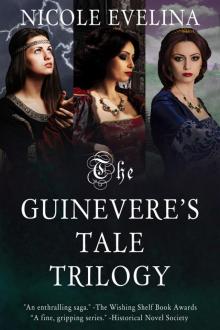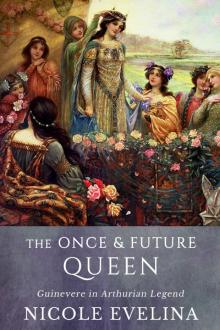- Home
- Nicole Evelina
Guinevere's Tale
Guinevere's Tale Read online
The Guinevere’s Tale Trilogy
Nicole Evelina
© 2018 Nicole Evelina
This is a work of fiction. Names, characters, businesses, places, events, and incidents are either the products of the author’s imagination or used in a fictitious manner. Any resemblance to actual persons, living or dead, or actual events is purely coincidental.
All rights reserved. This book or any portion thereof may not be reproduced or used in any manner whatsoever without the express written permission of the author, Nicole Evelina, or the publisher, Lawson Gartner Publishing, except for the use of brief quotations in a book review.
Lawson Gartner Publishing
PO Box 2021
Maryland Heights MO, 63043
www.lawsongartnerpublishing.com
Printed in the United States of America
First Printing 2018
ISBN
978-0-9967632-8-8 (print)
978-0-9967632-9-5 (e-book)
Library of Congress Control Number: 2018954315
Editor: Cassie Cox, Joy Editing
Cover Design: Jenny Quinlan, Historical Editorial
Layout: Qamber Designs and Media
Prologue
I am Guinevere.
I was once a queen, a lover, a wife, a mother, a priestess, and a friend. But all those roles are lost to me now; to history, I am simply a seductress, a misbegotten woman set astray by the evils of lust.
This is the image painted of me by subsequent generations, a story retold thousands of times. Yet, not one of those stories is correct. They were not there; they did not see through my eyes or feel my pain. My laughter was lost to them in the pages of history.
I made the mistake of allowing the bards to write my song. Events become muddled as ink touches paper, and truth becomes malleable as wax under a flame. Good men are relegated to the pages of inequity, without even an honest epitaph to mark their graves.
Arthur and I were human, no more, no less, though people choose to see it differently. We loved, we argued, we struggled, all in the name of a dream, a dream never to be fulfilled. Camelot is what fed the fires that stirred us to do as we did. History calls it sin, but we simply called it life.
The complexity of living has a way of shielding one’s eyes from the implications of one’s role. That is left for others to flesh out, and they so often manipulate it to suit their own needs. To those god-awful religious, I have become a whore; Arthur the victim of a fallen Eve; Morgan, a satanic faerie sent to lead us all astray. To the royalty, we have become symbols of the dreams they failed to create and Arthur is the hero of a nation, whereas to me, he was simply a man. To the poor, we are but a legend, never flesh and blood, a haunting story to be retold in times of tribulation, if only to inspire the will to survive.
We were so much more than mute skeletons doomed to an eternity in dust and confusion. We were people with a desire for life, a life of peace that would be our downfall. Why no one can look back through the years and recognize the human frailty beneath our actions, I will never understand. Some say grace formed my path; others call it a curse. Whatever it was, I deserve to be able to bear witness before being condemned by men who never saw my face.
It ends now. I will take back my voice and speak the truth of what happened. So shall the lies be revealed and Camelot’s former glory restored. Grieve with me, grieve for me, but do not believe the lies which time would sell. All I ask is that mankind listen to my words, and then judge me on their merit.
Chapter One
Spring 491
One more step, and there would be no turning back.
I glanced hesitantly at Viviane, who waited in the belly of a small boat at the edge of the gray-green lake. A slight breeze lifted her long, dark brown hair around her face to frame the crescent mark of a priestess tattooed on her brow. She stood patiently, one pale hand on the scrolling prow of the boat, which curved like a swan sleeping with its beak nestled under its wing. The vessel seemed to disappear in her wake, the other end obscured by a dense fog that rolled and curled in a sinuous dance that made it impossible to see what lay beyond. The air was thick with the heavy, choking fumes of the tar that turned the boat black, protecting it from the waters that lapped incessantly at its base and sides.
I looked down at my reflection; the gentle current pulled at the image of a girl hovering between youth and womanhood, fists balled nervously into the fabric of a green dress, wisps of black hair escaping from a long, tight braid flung over her left shoulder. She looked back at me with uncertain eyes, not emerald as they should be, but nearly black in the odd half-light where the spring sunshine gave way to the dower mists.
Who are you? she seemed to ask.
I wasn’t sure how to answer.
If I stepped aboard, I was no longer Guinevere, daughter of King Leodgrance of Gwynedd, but Guinevere, acolyte of the Goddess. The boat would take me to Avalon, away from the only life I had ever known and into a place of great mystery. I remembered my nursemaid, voice full of awe and reverence, describing Avalon as an earthly paradise—a holy place of temperate breezes and unending sunshine, where disease was unknown and crops needed no tending to produce a bountiful harvest each year without fail. Some of our servants even believed the hillsides teamed with faeries, dragons, elves, and all manner of mythical creatures that only came to ordinary mortals in their dreams.
Now I had to make a choice. Did I wish to go this place and learn to control the visions haunting my waking hours, or return to the familiar security of my home at Northgallis, despite the constant threat of Irish raids?
As if in answer, my sight clouded over against my will and a devastated seaport village arose before me, an unfamiliar place. My inner vision did not see the attack, but the aftermath lay before me as though I were there—the burned-out hulls of overturned ships, bodies being carted to the countryside by black-robed mourners for burial, crumbling houses laying bare the broken lives within.
I clenched my eyes closed, but the images remained, and they would come again, as they had so many times before. There would be no respite anytime soon if I didn’t go with Viviane and learn from the priestesses on the isle how to control this ability, this gift—as my mother called it—that I regarded as more of a curse.
Taking a deep breath, my decision made, I willed myself to lift my right foot, clad in a thick leather boot against the last of winter’s chill, from the sand and place it in the boat. I took Viviane’s cool, reassuring hand and let her help me aboard. She untied the mooring from a dock shrouded in fog and sank a thin pole into the invisible water. The boat glided smoothly across the lake, which scarcely seemed disturbed by its passage. As we moved, the world around us became even more engulfed in mist, until the shore was swallowed up and we floated in a land of milky vapor.
My stomach tightened. Had I made the right choice? What was I getting myself into? I was only eleven years old, not yet mature enough to foresee how such a decision might affect my future life and still enough of a child to already miss my family terribly. I fidgeted with my tunic as worry swam through my mind. What if the priestesses did not like me, or worse, what if the darker rumors were true?
I bit my thumbnail apprehensively as I thought about what I had heard—the priestesses were keepers of powerful magic that could influence the weather, bring forth life from the barren, or curse the wretched with unspeakable suffering, according to their will. Most common folk considered the priestesses harmless, but a vocal minority cowered in fear, regarding them as dark seekers of unnatural forces who, according to a few accounts, chose to roam the countryside in animal form, transforming back into humans only to cause mischie
f. What if they were right? What would these women do to me? I shivered at my own horrible imaginings of bloody sacrifice and evil magic.
No, I would not choose to indulge in such dark tales. Viviane had been nothing but kind to me, so I was determined to believe the same of the rest of Avalon’s inhabitants. I’d made my choice; now I had to see it through.
Straining to see beyond the mists, I tried to perceive the path Viviane followed with ease, navigating through the maze of sandbars and other perils as only a trained priestess could. Nature had provided a perfect ward against those who would do harm to the inhabitants of the isle. Like the tides that responded to the urgings of the moon, every morning, the mists rolled out across the lake, cutting off access to the uninitiated; each evening, they contracted around the Tor, the tallest, most sacred hill on the island, providing a thick blanket of protection to those who slumbered in the darkness below.
Eventually, the boat stilled and Viviane lifted the pole into the boat, a trail of water dribbling after it. She gave a sharp whistle, which was answered a short distance in front of us. I nearly toppled over as the boat was heaved forward by unseen hands.
Once ashore, the veil of mist thinned and I caught my first glimpse of Avalon. The land dipped lower as my eye moved inward from the lake. The shoreline gave way to damp marshes, slim clusters of reeds, and wetland grasses in which stately silver herons and colorful kingfishers played and hunted for fish, heedless of the activity around them.
Mountains and low hills veiled in shadow appeared brown, purple, and gray on the far horizon, acting as a screen separating Avalon from the outside world, while directly in front of me, the sun shone brightly on a cluster of buildings, giving their white-gray stone a radiant appearance. Beyond them, the sun warmed colorful gardens and vast green orchards that in a few months would be heavy with fragrant fruit. Farther to the east, a soft, cool breeze stirred tall golden grasses in the open plains, and shadows played hide-and-seek with the sun on the outskirts of tall forests of oak, ash, elm, and other sacred trees.
To my right, the sacred Tor loomed above the flat land, its humped shadow reflected in the still waters of the inland lake encircling its base. A spiral path wound around the hill, and nine pairs of evenly spaced pillars marked stations along the way. As my eyes traced the pathway upward, I was surprised to find the summit was ringed with standing stones, the two taller portal stones capped by a horizontal slab, much like the Druid’s circle several days ride to the east.
I was immediately caught up in the buzz of activity generated by the throng of brightly clad women preparing for some great event. A few younger women dressed in robes of forest green helped secure the boat, while young and old alike scurried up and down the stairs of a tall, stately columned building, and others carried supplies to the long, flat houses that lay adjacent. I marveled at their organization. In the flurry of activity, none seemed to lose sense of her purpose. Even my father’s army could not boast that.
Viviane followed the line of my eyes and smiled, her blue eyes twinkling. “These are your sisters now, Guinevere. They will be your only friends and family for many years. You will be introduced to them later. Come.”
She took my hand and showed me into one of the flat houses near the gardens. I met a short dark-haired girl, who I guessed to be one or two years older than me.
“Mona, this is Guinevere, our newest candidate. Guinevere, Mona will help you become acquainted with the isle,” Viviane said by way of introduction.
Mona gave me a welcoming smile as Viviane departed. Then, with a fluid gesture, she ushered me inside to a small bedroom where I washed the dust from my hair, feet, and skin and changed into a pure white gown, just like the one Mona wore.
Snatching up my discarded traveling clothes and a ball of soap from the bedside table, Mona strode across the terrace overlooking the lake. She was halfway down a gently sloping hill before she paused then turned, a small frown creasing the otherwise smooth skin between her eyes.
“This way,” she said, beckoning before she wound her way through a series of herb, vegetable, and flower gardens. She walked along the edge of an apple orchard to a clear, softly flowing stream.
I remembered hearing that waters such as those were rumored to heal every illness and even grant eternal youth. I glanced about in awe. Were the stories true?
Mona handed me my tunic, which I held dumbly. I watched as my tan cloak turned the color of freshly tilled earth as she submerged it in the water. She wrung it out, laid it flat against the surface of a large, smooth stone, and began running the fragrant lavender soap over the material, working it into the fibers with her fingertips.
I was utterly transfixed. At home, we had servants and slaves who took our soiled linens and then returned them to us clean. I had never thought to question how it happened.
Mona looked up at me with eyes as dark as her hair, the ghost of a smile playing at her lips as if she could read my thoughts. “Go on,” she said encouragingly, gesturing toward the tunic I still held balled between my hands. “You will have to learn to clean your own clothes. You will have only three tunics, two for daily use and one for rituals, so take good care of them. You will need to learn to mend them too, but that is a lesson for another day.”
My heart twisted at the thought of having to do menial labor, and the better part of me wanted to refuse. I opened my mouth in protest, but Mona’s gaze silenced me. I knelt down beside her and plunged my tunic into the stream. I gasped, not expecting the water to be icy cold. Mimicking what Mona had done, I lifted my dress out of the water and twisted the sodden lump of material between my reddened fingers, nearly drenching myself in the process.
Mona grabbed my hands and pulled my arms out straight. “Hold it out, away from you,” she instructed, “unless you want to take a bath at the same time.” She giggled, not unkindly, at my ineptitude.
I spread out my dripping tunic on Mona’s chosen rock and began to soap it. She looked at my hands with curiosity, no doubt wondering why they resembled the rough, callused hands of a warrior in training instead of the smooth, silky skin of most noblewomen. I could sense the unspoken question she was too polite to ask.
“My mother,” I began, throat constricting with emotion as I pictured her face, “has been training me to wield a sword since I was old enough to feed myself. She is a Votadini from the lands far to the north. It is a tradition of her homeland that all the women of the tribe be trained to fight alongside their men in battle.”
“Are you good at it? The fighting?” Mona’s interest came through as pure excitement.
I dipped the frothy material back into the water, fighting the current and the leaden heaviness of the cloth as I tried to rinse it clean. “I thought I was,” I said quietly, disappointment slowly creeping into my voice as I spoke, “but I could not even defend myself when we were attacked. I nearly lost my life, but my mother saved me.”
Mercifully, Mona asked no more questions. I told myself it was all in the past now. No acts of violence were allowed on the isle, so I would have to let go of my training and the horrors of the day it failed me, just as I would have to relinquish my noble rank.
By the time we completed our task, it was late afternoon. Instead of taking me back to the house where I had changed clothes earlier, Mona guided me through the maze of trees to a long, single-story building of white-gray stone, one of the ones that seemed to glimmer from the shore.
“This is the House of Nine,” she explained on tiptoe as she draped my wet garments over a sturdy branch of white-barked birch about half a foot above her head. “If the Lady deems you a worthy student, you will live here with me and seven other girls. We are all about the same age.” She glanced over her shoulder. “That is Grainne peeking out from the doorway.”
The golden-haired girl shrank back momentarily at the sound of her name, seemingly embarrassed at being caught spying on us, but then she came boun
ding toward us like an excited puppy. Trailing hesitantly in her shadow was a small brunette girl who exuded peace and calm in equal amount to Grainne’s energy.
“You must be Guinevere,” Grainne said by way of greeting. But before I had time to reply, she asked, “So is it true you were kidnapped by Irish raiders?”
“You told me they were landless tribal outlaws.” The smaller, dark-haired girl scowled at Mona before introducing herself as Rowena.
“Then you must have misheard me,” Grainne shot back. “I said no such thing.”
For a moment I couldn’t respond, shocked they had been gossiping about me before I even arrived.
“In the House of Nine, there are no secrets,” Mona whispered in my ear. “We know every scrap of one another’s business.”
Grainne and Rowena looked at me expectantly, clearly waiting for my answer.
“Well, I yes,” I began. “I was attacked—”
The tinkling of a soft bell cut me off. Viviane appeared in the doorway and bid us to follow her.
“Where are we going?” I asked, unsure of what activity might begin when the sun was fast sinking below the horizon.
“To meet the Lady of the Lake,” Viviane answered.
Viviane escorted us into a massive temple-like building that lay open to the lake and world of mists beyond, and she led us up a set of steep stairs. How silent the structure seemed to be, although the air around us vibrated with a low hum. After passing through a small foyer, we entered a large square room with ceilings as high as the tips of ancient oaks. As my eyes adjusted to the light, I began to make out figures in the room behind us. At first they appeared as phantoms without faces, but after a moment, we were surrounded in a semi-circle by a crowd of women dressed in brightly colored gowns of forest green, pearl white, and the same ocean blue Viviane wore. She led me to stand in front of a throne-like chair at the far end of the room.

 Guinevere's Tale
Guinevere's Tale Been Searching For You
Been Searching For You The Once and Future Queen
The Once and Future Queen Madame Presidentess
Madame Presidentess